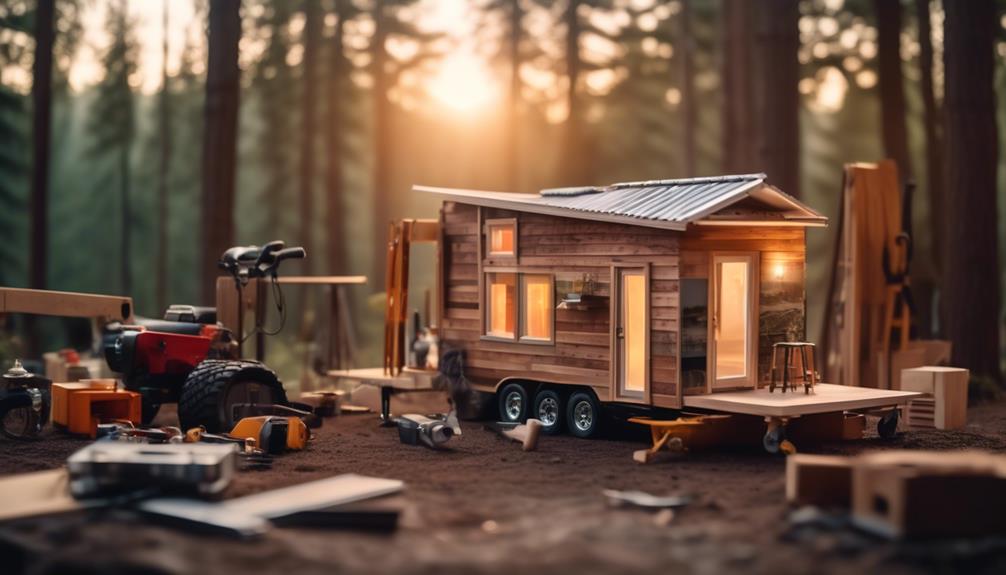As you stand at the crossroads of cost and compliance, you might consider building a tiny home without a permit. You've got to weigh your wallet against the rulebook, as sidestepping the formalities can save you a pretty penny. You'll dodge the bureaucratic bullet of paperwork and possibly gain more creative control over your home's design.
But, let's not forget that this path is fraught with potential pitfalls. Without a permit, you might find yourself in murky legal waters, facing fines or forced changes down the line. You're also taking a gamble on your tiny home's safety standards, which could leave you, quite literally, out in the cold.
As you ponder the balance between freedom and foresight, consider the long-term implications of your decision, because what seems like smooth sailing now could lead to stormy weather later on.
Key Takeaways
- Building a tiny home without a permit can lead to substantial cost savings by eliminating permit fees and requirements.
- Unpermitted construction offers the flexibility to build a tiny house that reflects your vision and allocate funds to higher quality materials or custom features.
- Skipping permits may result in fines or mandated deconstruction, and can complicate getting a loan or insurance for the structure.
- While unpermitted construction allows for more freedom in layout and schedule, it also presents potential risks and severe financial implications, and obtaining a permit ensures legal construction.
Navigating Legal Implications
To ensure compliance with local laws, you must familiarize yourself with the building permit requirements specific to tiny houses in your area. The Tiny House Movement has spurred local governments to adapt codes and zoning laws, resulting in a complex tapestry of Tiny House Regulations.
When building a home, you're not just crafting a living space; you're navigating legal implications that can affect your tiny house's future. Whether you're considering a foundation or wheels, you need to adhere to codes and laws that dictate the minutiae of home building.
Certified RV and mobile home manufacturers may face stringent inspections, impacting your tiny home's legal standing. Be aware, too, of how camping exemptions and wheels influence zoning regulations, ensuring you're not caught off-guard by enforcement actions.
Cost Savings Considerations
You must weigh the financial risks of building a tiny home without a permit against the potential cost savings.
Unpermitted construction may offer benefits like reduced expenses and bureaucratic hurdles, but it also comes with the possibility of fines and legal complications.
Carefully assess both the immediate and long-term financial implications to ensure compliance and safeguard your investment.
Financial Risk Assessment
Assessing the financial risks of building a tiny home without a permit reveals potential cost savings in construction and long-term living expenses, yet it requires careful consideration of regulatory compliance and financing options.
The allure of reduced Tiny House Costs is substantial, but weigh these savings against the potential legal ramifications tied to unauthorized construction.
Consider the following:
- Building Codes and Zoning: Skipping permits may lead to fines or mandated deconstruction.
- Financial Risk Assessment: Unpermitted structures can complicate getting a loan or insurance.
- Cost: Initial savings may be negated by later compliance efforts.
- Permit: Obtaining one ensures legal construction, safeguarding your investment.
Innovatively build a tiny home, but remain compliance-driven. Sidestepping permits presents a risky venture with possible severe financial implications.
Unpermitted Construction Benefits
Building a tiny home without a permit can offer substantial cost savings, as it eliminates the need to pay for permit fees and comply with the often expensive requirements that accompany the formal approval process. As you consider the pros and cons, understand that living in a tiny home often means prioritizing innovation and cost-effectiveness.
By opting for unpermitted construction, you're not just cutting corners on expenses—you're embracing a flexibility that allows you to build a tiny house that's a true reflection of your vision.
Tiny house owners who decide whether to bypass permits must weigh these unpermitted construction benefits against potential risks. Living tiny without regulatory constraints means you can allocate funds to higher quality materials or custom features, maximizing the value of your investment while living on your own terms.
Building Process Flexibility

Choosing to construct a tiny home without a permit grants you unparalleled flexibility, allowing for a highly personalized and adaptable design process that directly aligns with your specific living requirements and aesthetic preferences.
Consider these crucial aspects:
- Design Customization: Tailor your tiny home's layout without rigid permit constraints.
- Timeline Efficiency: Build on your schedule, potentially accelerating the transition to tiny living.
- Cost Savings: Avoid the financial burden of permit fees, allocating funds to innovative design features.
- Regulatory Independence: Operate outside established codes, but remain mindful of the potential cons of tiny, unpermitted structures within the tiny house community.
This building process flexibility is necessary to build a home that embodies the innovative spirit of the Tiny House Nation, while still navigating the complexities of local compliance.
Safety and Insurance Issues
While designing your tiny home without a permit may offer flexibility, it's crucial to consider the safety and insurance ramifications of this decision to ensure compliance and avoid future legal complications. Tiny houses, though innovative and requiring less maintenance, are not exempt from house regulations. If you choose to live in the home without the necessary permits, you may face significant safety and insurance issues.
| Safety Concerns | Insurance Implications |
|---|---|
| Potential for safety hazards | May not cover accidents or damages |
| Legal liabilities | Difficulty in obtaining coverage |
| Non-compliance with codes | Higher premiums or policy rejections |
| Resale complications | Challenges in real estate marketability |
Resale and Marketability Challenges

When you consider selling your tiny home, be aware that the niche appeal and zoning restrictions may complicate the resale process and affect marketability. Despite the growing popularity of Tiny House Living, the unique characteristics of these homes can present distinct marketability challenges:
- Limited Buyer Pool: The specialized nature of a tiny living space can narrow your potential buyer market.
- Zoning Challenges: Many areas in the United States have strict zoning laws that can hinder the placement of a tiny house on wheels or a conventional home on a small parcel of land.
- Perceived Value: Buyers may be skeptical of the value versus square footage, affecting resale.
- Cost of Living Perception: Some buyers equate size with luxury, potentially making tiny homes a harder sell.
Environmental Impact and Sustainability
By opting for a tiny home, you significantly reduce your environmental footprint, as these dwellings typically consume less energy and contribute to a decrease in carbon emissions. Living in a home with limited square footage, tiny home owners inherently embrace sustainability.
Houses require less resources to build and maintain, meaning you're living with a lighter ecological touch.
Tiny houses come with the potential to incorporate innovative features, such as solar panels, which not only save money but also promote renewable energy use.
Frequently Asked Questions
What Are the 3 Negative Features of a Tiny House?
You'll face privacy concerns, zoning issues, and storage scarcity in a tiny house, demanding lifestyle adjustments and posing resale obstacles due to minimalistic living and utility constraints. Legal challenges may also arise.
Can You Make a Tiny Home Permanent?
Want permanent tiny home living? You'll navigate zoning challenges, face property taxes, and weigh mobility against resale value. Can stealth living sidestep legal loopholes? It's a lifestyle fit with investment risks and off-grid potential.
Does a Tiny House Need a Foundation?
You don't necessarily need a foundation for your tiny house if you're embracing mobile living. However, skid foundations can enhance structural stability, combat zoning challenges, and improve weather resilience with proper ground anchoring. Consider eco footprint and investment.
Why Not to Build a Tiny House?
You shouldn't build a tiny house due to zoning challenges, legal risks, and building restrictions. Investment uncertainty, resale difficulties, and insurance issues complicate finances, while limited space and privacy concerns demand major lifestyle adjustments and utility complications.
Conclusion
In conclusion, while you might save up to 20% on building costs by forgoing a permit, you're risking non-compliance with local regulations. This could lead to hefty fines and hinder your ability to insure or sell your tiny home.
Always prioritize safety and legality; ensure your tiny haven complies with building codes and environmental standards. The peace of mind knowing your home meets regulatory requirements is invaluable.
Be smart, build with a permit.

